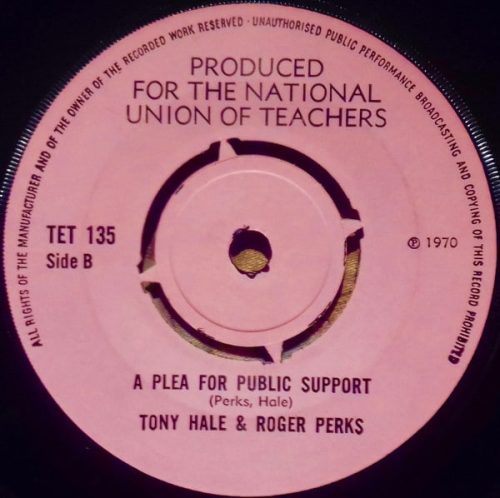Why Strike?
In my late father's house, I found a specific 7 inch single. Dad owned a small collection of records. I knew them well. But as a child I wasn't allowed to listen to this one. For some reason it was off limits. The day I found it hidden inside an LP sleeve was the last time I saw it. Now here it was again. This time with no paternal oversight. I put it on the turntable:
Please support your local teacher
He's the man with hole in shoe
His patchy clothes disgrace
Reflect a downcast face
You can help him if you choose.
A Plea for Public Support by Tony Hale & Roger Perks, a protest song from 1970, for the National Union of Teachers. Listen here
It's a derivative 60's track woefully describing, in exactly 4 minutes, the lot of educators seeking a salary uplift of around £200 (per annum). At the time, Dad was a maths advisor for our local authority. I guess the vinyl was censored in case I got the wrong idea about my reception teacher, the blissfully lovely Mrs S. I wonder how he came by it? Too late to ask now.
How Angry Are You?
...we didn't all come out on strike for fun
So give us fair return
Don't fiddle while Rome burns
You can help us if you dare.
With words strangely prescient of the context 53 years later, the track is no more than a polite request for acknowledgment. It is not an enthusiastic call to action. Hale & Perks could just as well be lamenting a lost love or advocating a liberal social philosophy.
Compare it to the visceral rant of Another Sky's 'Brave Face', a breakup protest against a patronising ex-partner. I think this kind of song more accurately expresses the mood in hearts and minds this week.
In 2023 anger is more personal than it is collective.
Ethical Compass
We are each navigating a moral territory that only emerges from the fog every decade or so. But this time the decision to strike is conflated with painful local, national, and global recalibrations. The constellation of COVID legacy, rising costs, devastating war and political decay frame our choice.
Do you refuse to work; an act that represents furious dissatisfaction driven by aspirations for a better future? Do you continue to work, risk complicity or appeasement, but maintain the vocational commitment that drew you to teach in the first place?
In a values-driven profession you need a framework and an ethical compass.
How Do You 'Do Conflict?'
Ask yourself this, How do I do conflict?
Your nature and early experience dispose you to 'do conflict' in a specific way; a balance of two features: your ability to know and assert your side of the argument and your willingness to cooperate in seeking a positive-sum outcome (where both sides gain).
Competing is assertive and uncooperative. You want your position to be the outcome. On the other hand, accommodating is unassertive and cooperative. You put your own needs aside. Maybe you tend to be avoiding - neither assertive nor cooperative. You'd rather just not get involved. Then there's collaborating which is both assertive and cooperative. You want to work with others for a solution that's meaningful to everyone.
You'll use necessary latitude around your default behaviour. Advocating for a child at risk requires competing and collaborating. Avoiding or accommodating is the better choice when faced with a mugger.
Your Own Why
As I write, union leaders are meeting UK Education Secretary Gillian Keegan, pursuing an increasingly elusive alternative to strike action by teachers. Maybe both sides are collaborating. Maybe they're locked in competition.
If strikes are postponed, rescheduled or paused, you still faced the choice of how to act this week. And whatever your decision was, it might have been as much about your level of anger; about how you 'do conflict'; and about the state of the world right now, as it was about the issues at stake.
Knowing that - however hard the choice was to make - at least you'll have a greater insight into why you made it.
Update
Sadly, talks didn't resolve the conflict. Strikes will begin tomorrow, 1 Feb. A colleague texted to say he'd be striking but would struggle to get to the march. Because of the train strike.
Another sent this:
To compete or cooperate?
To stand up for pay and conditions or for the vocational pull that no other job can instill.
My view is one driven by an overwhelming sense of moral purpose.
I don't need to check my wage packet to know if I'm doing a good job.
I need to look into the eyes of the children I serve both at work and at home.
This is a profession on its knees.
Teachers are checking out rather than wanting to check in.
They are furious instead of curious about learning.
The joys of children's company and their insights are becoming a chore and a bore.
Strike if you want but children deserve payback in full.


